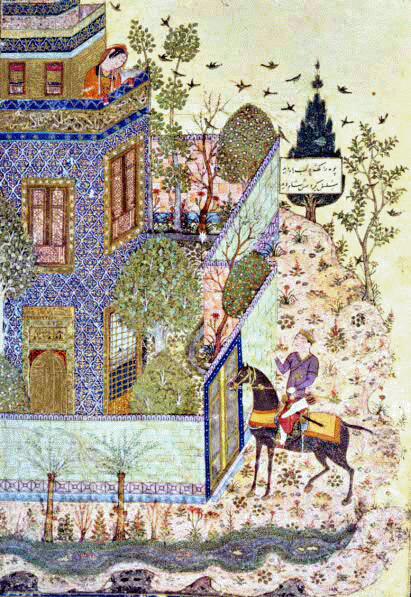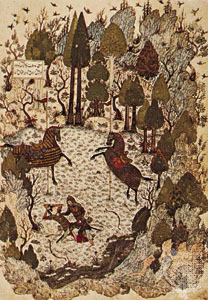Junayd Baghdadi Biography-Persian: جنید بغدادی:
Junayd Baghdadi (Persian: جنید بغدادی) was one of the most famous of the early Persian Muslim mystics, or Sufis, of Islam and is a central figure in the golden chain of many Sufi orders. Junayd taught in Baghdad throughout his spiritual lifetime and was an important figure in the development of central Sufi doctrine. Junayd, like Hasan of Basra before him, was widely revered by his students and disciples as well as quoted by other mystics. Because of his importance in Sufi theology, Junayd was often referred to as the "Sultan".
About Teachings:
Junaid’s contributions to Sufism are many. His basic ideas deal a progression that leads one to “annihilate” oneself so as to be in a closer union with the Divine. People need to “relinquish natural desires, to wipe out human attributes, to discard selfish motives, to cultivate spiritual qualities, to devote oneself to true knowledge, to do what is best in the context of eternity, to wish good for the entire community, to be truly faithful to God, and to follow the Prophet in the matters of the Shari’a”. This starts with the practice of renunciation (zuhd) and continues with withdrawal from society, intensive concentration on devotion (ibadat) & remembrance (dhikr) of God, sincerity (ikhlas), and contemplation (muraqaba) respectively; contemplation produces fana. This type of “semantic struggle “ recreates the experience of trial (bala) that is key in Junaid’s writings. This enables people to enter into the state of fana. Junaid divides up the state of fana into three parts: “1) the passing away from one’s attributes through the effort of constantly opposing one’s ego-self (nafs); 2) passing away from one’s sense of accomplishment, that is, passing away from ‘one’s share of the sweet deserts and pleasures of obedience’; and 3) passing away from the vision of the reality ‘of your ecstasies as the sign of the real overpowers you’”. All of these stages help one to achieve fana. Once that has been attained, a person is in the state of remaining, or baqa. It is through the stage of baqa that one is able to find God – or rather, have God find him / her. Reaching baqa is not an easy thing to do though; getting through the three stages requires strict discipline and patience. There is even debate amongst scholars as to whether or not the third stage is even possible to reach. Junaid helped establish the “sober” school of Sufi thought, which meant that he was very logical and scholarly about his definitions of various virtues, Tawhid, etc. Sober Sufism is characterized by people who “experience fana and do not subsist in that state of selfless absorption in God but find themselves returned to their senses by God. Such returnees from the experience of selflessness are thus reconstituted as renewed selves,” just like an intoxicated person sobering up. For example, Junaid is quoted as saying, “The water takes on the color of the cup.” While this might seem rather confusing at first, ‘Abd al-Hakeem Carney explains it best: “When the water is understood here to refer to the Light of Divine self-disclosure, we are led to the important concept of ‘capacity,’ whereby the Divine epiphany is received by the heart of any person according to that person’s particular receptive capacity and will be ‘colored’ by that person’s nature”. As one can see, such a simple phrase holds such deep meaning; it brings the reader back to a deeper understanding of God through a more thoughtful metaphor. been attained, a person is in the state of remaining, or baqa. It is through the stage of baqa that one is able to find God – or rather, have God find him / her. Reaching baqa is not an easy thing to do though; getting through the three stages requires strict discipline and patience. There is even debate amongst scholars as to whether or not the third stage is even possible to reach. Junaid helped establish the “sober” school of Sufi thought, which meant that he was very logical and scholarly about his definitions of various virtues, Tawhid, etc. Sober Sufism is characterized by people who “experience fana and do not subsist in that state of selfless absorption in God but find themselves returned to their senses by God. Such returnees from the experience of selflessness are thus reconstituted as renewed selves,” just like an intoxicated person sobering up. For example, Junaid is quoted as saying, “The water takes on the color of the cup.” While this might seem rather confusing at first, ‘Abd al-Hakeem Carney explains it best: “When the water is understood here to refer to the Light of Divine self-disclosure, we are led to the important concept of ‘capacity,’ whereby the Divine epiphany is received by the heart of any person according to that person’s particular receptive capacity and will be ‘colored’ by that person’s nature”. As one can see, such a simple phrase holds such deep meaning; it brings the reader back to a deeper understanding of God through a more thoughtful metaphor.
About Difficulties:
There are a few other problems when encountering Junaid’s texts. Junaid believed that Sufism was a way for the elite to reach God, not the common man. “Tasawwuf,” he says, “is to purge the heart from every wish to follow the path of common men”.This further elaborates on why Junaid wrote so eloquently. Also, according to Sells, “…Junaid seems to presuppose that his hearer or reader has had the experience about which he is speaking – or, even more radically, that the hearer or reader is able to enter that experience, or some re-creation of it – at the moment of encounter with Junaid’s words”. This statement makes it seem like
Junaid was writing to a specific sect of the elite that he described earlier. The elite that he refers to are the elect, or “a tightly-knit group of ‘brethren’ that Junaid designates by such phrases as ‘the choice of believers’ or ‘the pure ones.’ They play significant roles in the community of believers…”. As mentioned, Junaid has always been difficult to read for scholars because most of his writings have been lost to time. Junaid constantly uses precise words & language specific to try and describe God, the longing for Him, and the human condition. His ornate language immediately turns off most people, but Junaid had a reason for writing so cryptically. According to the Encyclopedia of Islam, Junaid found out that a letter he had written was opened by a stranger before it got to its destination: “doubtless by some zealot desirous of finding cause for impugning his orthodoxy; and to this ever-present danger must in part be attributed the deliberate preciosity which marks the writings of all the mystics of J̲unayd's period”. This constant worry about others getting a hold of his ideas caused Junaid to become very protective of his writings. (Junayd Baghdadi Biography)
Refer to: http://en.wikipedia.org/wiki/Junayd_of_Baghdad
Edited by Kevin from Xiamen Romandy Art Limited.
(Xiamen Romandy Art is a professional oil paintings supplier from China. If you want to convert your photos into high quality oil paintings, or you want the masterpiece oil painting reproductions, please don's hesitate to contact with us.)
Romandy Art Website: http://www.oilpaintingcentre.com
Tags:Junayd Baghdadi Biography-Persian: جنید بغدادی
|